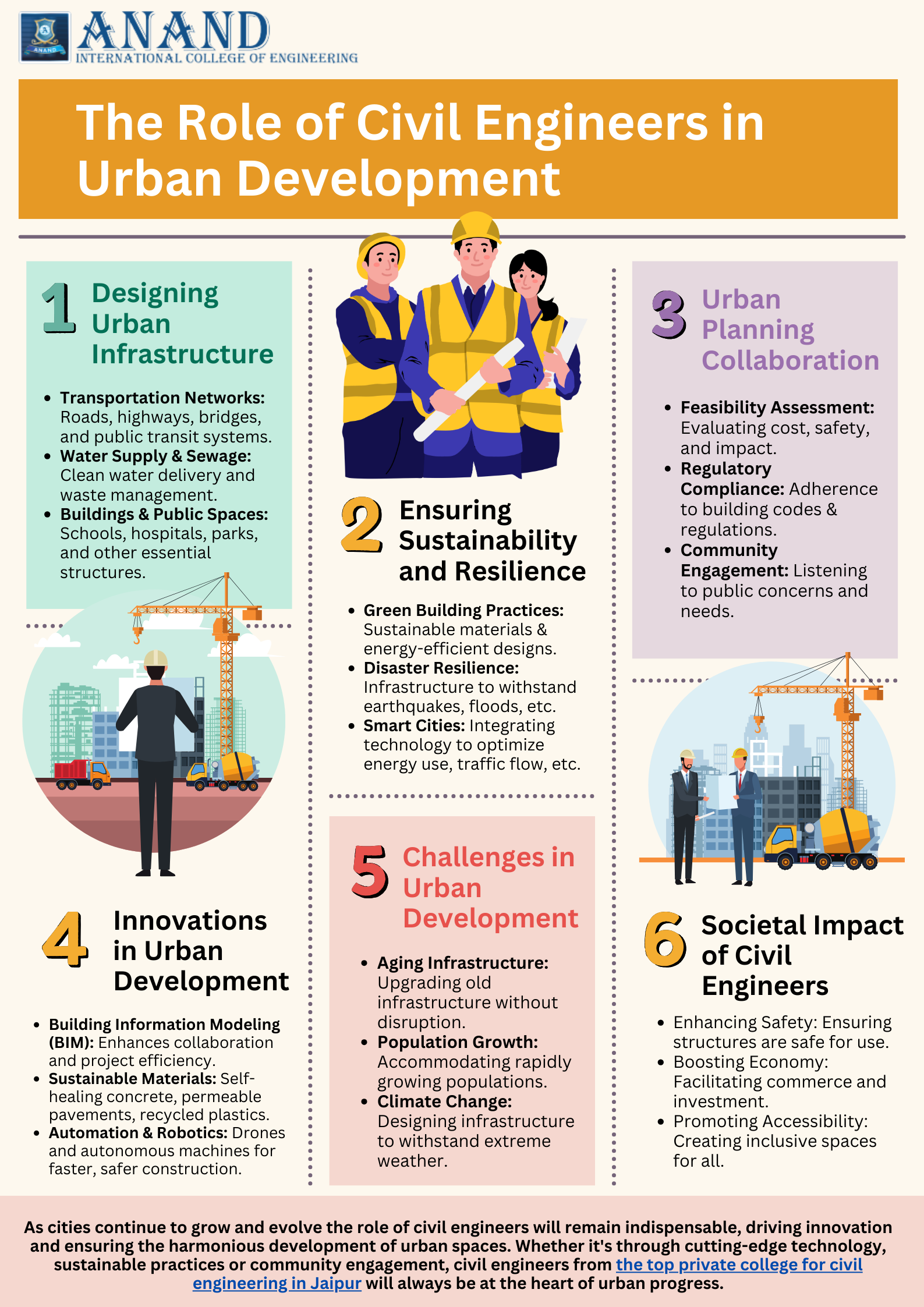Urban development is the backbone of modern civilization that shapes the cities and towns we live in, work in and enjoy. Civil engineers from the best college for engineering in Jaipur play a pivotal role in designing, building and maintaining the structures that vary from the towering skyscrapers of urban centers to the intricate network of roads and bridges. Their work extends beyond mere construction which contributes to sustainability, resilience, and the overall quality of life in urban areas.
This article explores the vital role civil engineers play in urban development and sheds light on their responsibilities, challenges and the innovative solutions they bring to the table.
The Crucial Role of Civil Engineers in Shaping Urban Development
1. Designing Urban Infrastructure
Civil engineers are the architects of urban infrastructure who are responsible for designing critical systems that sustain city life. These include:
- Transportation Networks: Roads, highways, bridges and public transit systems ensure efficient movement of people and goods.
- Water Supply and Sewage Systems: Ensuring clean water delivery and effective waste management is fundamental to public health.
- Buildings and Public Spaces: Civil engineers design structures such as schools, hospitals and parks while balancing functionality, aesthetics and safety.
Their designs must accommodate growing populations, evolving technologies and environmental concerns, requiring precision and foresight.
2. Ensuring Sustainability and Resilience
Urban areas face increasing pressure to become more sustainable and resilient. Civil engineers are at the forefront of addressing these challenges by:
- Implementing Green Building Practices: Using sustainable materials and energy-efficient designs to reduce environmental impact.
- Enhancing Resilience to Natural Disasters: Designing buildings and infrastructure that can withstand earthquakes, floods, and other disasters to minimize damage and loss of life.
- Promoting Smart Cities: Integrating technology to optimize energy usage, traffic flow and public services for greater efficiency and sustainability.
Their work ensures cities not only meet present needs but also remain adaptable to future challenges.
3. Urban Planning Collaboration
Civil engineers collaborate closely with urban planners, architects and government officials to create cohesive urban environments. Their role includes:
- Assessing Feasibility: Evaluating the practicality of proposed projects in terms of cost, safety and environmental impact.
- Adhering to Regulations: Ensuring that all projects comply with local, national and international building codes and regulations.
- Community Engagement: Participating in public consultations to address the concerns of residents and ensure projects benefit the broader community.
Through these collaborations civil engineers help shape urban areas that are functional, inclusive and harmonious.
4. Innovations in Urban Development
Civil engineering is an ever-evolving field with technological advancements driving innovation in urban development. Some notable innovations include:
- BIM (Building Information Modeling): A digital representation of physical and functional characteristics of a facility which enhances collaboration and efficiency.
- Sustainable Materials: Innovations such as self-healing concrete, recycled plastics in road construction and permeable pavements reduce environmental impact.
- Automation and Robotics: The use of drones for site surveys and autonomous machinery for construction speeds up projects and improves safety.
These innovations not only enhance efficiency and cost-effectiveness but also contribute to more sustainable urban environments.
5. Challenges in Urban Development
Civil engineers face numerous challenges in urban development, including:
- Aging Infrastructure: Maintaining and upgrading outdated infrastructure in established cities without disrupting daily life.
- Population Growth and Urbanization: Designing systems that can accommodate rapidly growing urban populations while maintaining quality and accessibility.
- Climate Change: Developing infrastructure that can withstand extreme weather events and changing climate patterns.
Addressing these challenges requires a blend of technical expertise, creativity and adaptability.
6. The Societal Impact of Civil Engineers
Beyond the technical aspects, civil engineers profoundly impact society by improving the quality of life in urban areas. They:
- Enhance Public Safety: Ensuring that buildings, bridges, and other structures are safe for use.
- Boost Economic Growth: Developing infrastructure that facilitates commerce, tourism and investment.
- Promote Equity and Accessibility: Designing inclusive spaces that cater to all members of the community including those with disabilities.
By prioritizing the needs of society civil engineers play a crucial role in fostering thriving and vibrant urban communities.
Conclusion
Civil engineers are the unsung heroes of urban development, turning blueprints into reality and ensuring that cities are livable, sustainable and resilient. Their work is essential to the continuous evolution of urban areas, addressing present challenges while anticipating future needs. For students aspiring to become civil engineers, the field offers the opportunity to leave a lasting impact on society that shapes the world for generations to come.
As cities continue to grow and evolve the role of civil engineers will remain indispensable, driving innovation and ensuring the harmonious development of urban spaces. Whether it’s through cutting-edge technology, sustainable practices or community engagement, civil engineers from the top private college for civil engineering in Jaipur will always be at the heart of urban progress.


